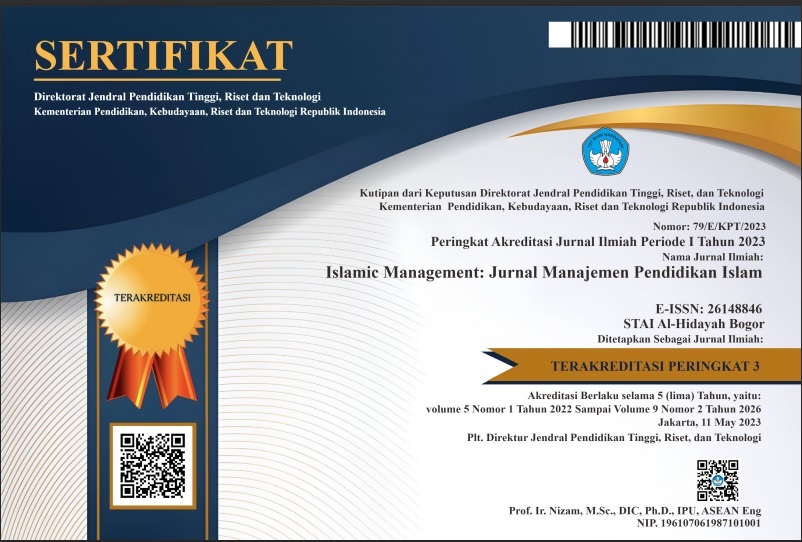PENGARUH INTENSITAS PENGUNAAN GADGET DAN KEIKUTSERTAAN TPA TERHADAP KEMAMPUAN MEMBACA AL-QURAN
DOI:
https://doi.org/10.30868/im.v4i02.1401Abstract
This study aims to determine (1) the effect of the intensity of using gadget  on the ability recite Qur’an, (2) the effect of TPA participation on the ability recite Qur’an, (3 ) the effect of the intensity of using gadget  and TPA participation on the ability recite Qur’an. The study was conducted in 2020. The population is fifth grade students of SD Negeri Cluster II Ahmad Yani Laweyan Surakarta on academic years of 2020/2021. The samples were drawn randomly from the population using a stratified random sampling technique. The study used experimental methods. The data were analyzed using two - way analysis of variance and further test of data processing with software SPSS 22 For Windows. The results showed that the highest average score was students who had low intensity of using gadget  and participated in TPA (89.467) and the lowest score was students who had low intensity of using gadget  and did not attend TPA (58.5). This proves that the higher the use of gadget s and the more active students are in participating in the TPA, the higher the ability recite Qur’an. So, it can be concluded (1) The intensity of using gadget  did not affect the students' ability to read Al-Quran, (2) TPA participation affected the ability recite Qur’an, (3) The intensity of using gadget  and TPA participation affected the ability recite Al-Quran.
Keywords: gadget, participation, abilityÂReferences
Asmuni, Asmuni. 2020. “Problematika Pembelajaran Daring Di Masa Pandemi Covid-19 Dan Solusi Pemecahannya.†Jurnal Paedagogy 7 (4): 281. https://doi.org/10.33394/jp.v7i4.2941.
Aziz, Abdul. 2016. “Handphone Mempengaruhi Terhadap Perilaku Remaja Usia SLTP (13-15 Tahun) Di Dusun Tegalpare Kecamatan Muncar Kabupaten Banyuwangi.†Darussalam: Jurnal Pendidikan VII (2): 123–48.
Azzahra, Fatimah. 2019. “Hubungan Antara Intensitas Penggunaan Gadget.â€
Chairani, Lisya, and M.A Subandi. 2010. “Psikologi Santri Penghafal Al-Qur’an (Peranan Regulasi Diri).†In . Yogyakarta: Pustaka Pelajar.
Irawan, J. 2013. Pengaruh Kegunaan Gadget Terhadap Kemampuan Bersosialisasi Pada Remaja. Fakultas Psikologi: Universitas Islam Riau.
Malik, Hatta Abdul. 2013. “Pemberdayaan Taman Pendidikan Al-Qur’an (TPQ) ALhusna Pasadena Semarang.†Dimas: Jurnal Pemikiran Agama Untuk Pemberdayaan 13 (2): 387–404. http://www.journal.walisongo.ac.id/index.php/dimas/article/view/60.
Mansur. 2011. “Pendidikan Anak Usia Dini (PAUD).†In . Yogyakarta: Pustaka Pelajar.
Nurjayanti, Desi, Adriani Rahma Pudyaningtyas, and Nurul Kusuma Dewi. 2020. “PENERAPAN PROGRAM TAMAN PENDIDIKAN ALQURAN ( TPA ) UNTUK ANAK USIA DINI Program Studi PG-PAUD , Universitas Sebelas Maret Surakarta Harus Memiliki Lembaga Atau Organisasi Payung TPA Dan Dikepalai Oleh Kepala Unit Diwajibkan Memiliki Program Yang Jelas Yai.†Jurnal Kumara Cendekia 8 (2): 183–96.
Priyadi, Unggul, Syarif Nur Hidayat, and Aprillia Islamawati. 2013. “Peningkatan Mutu Pembelajaran Taman Pendidikan Al-Qur’an Dengan Pembuatan Kurikulum TPA.†Jurnal Inovasi Dan Kewirausahaan Seri Pengabdian Masyarakat 2 (3): 204–11.
Sudjana, D. 2000. “Strategi Pembelajaran Dalam Pendidikan Luar Sekolah.†In . Bandung: Nusantara Press.
Tanjung, Fajar Sri, Emy Huriyati, and Djauhar Ismail. 2017. “Intensitas Penggunaan Gadget Pada Anak Prasekolah Yang Kelebihan Berat Badan Di Yogyakarta (Intensity of Gadget Use among Overweight Preschool Children in Yogyakarta).†Berita Kedokteran Masyarakat Journal of Community Medicine and Public Health 33 (12): 603–8.
Widiawati, I, Sugiman, H & Edy. 2014. “Pengaruh Penggunaan Gadget Terhadap Daya Kembang Anak.†E-Journal Keperawatan 6: 1–6.
Windi. 2009. “Kontribusi Taman Pendidikan Al-Qur’an (TPA) Terhadap Pencapaian Kompetensi Pembelajaran Pendidikan Agama Islam Di Sekolah Dalam Hal Baca-Tulis Al-Qur’an: Studi Kasus Di SDN 02 Pondok Pucung, Kecamatan Pondok Aren, Kota Tangerang-Selatan, Propinsi Banten.â€
Downloads
Published
How to Cite
Issue
Section
Citation Check
License
Authors who publish with this journal agree to the following terms:
- Authors retain copyright and grant the journal right of first publication with the work simultaneously licensed under a Creative Commons Attribution License that allows others to share the work with an acknowledgment of the work's authorship and initial publication in this journal.
- Authors are able to enter into separate, additional contractual arrangements for the non-exclusive distribution of the journal's published version of the work (e.g., post it to an institutional repository or publish it in a book), with an acknowledgment of its initial publication in this journal.
- Authors are permitted and encouraged to post their work online (e.g., in institutional repositories or on their website) prior to and during the submission process, as it can lead to productive exchanges, as well as earlier and greater citation of published work (See The Effect of Open Access).







